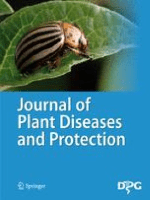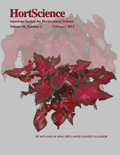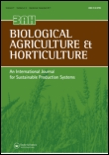
Horticultural Science & Technology
Scope & Guideline
Fostering collaboration in the vibrant world of horticultural science.
Introduction
Aims and Scopes
- Plant Growth and Development:
Research on the physiological and genetic factors influencing plant growth and development, including studies on temperature effects, nutrient uptake, and irrigation methods. - Postharvest Technology:
Innovative techniques and methods for improving postharvest handling, storage, and quality of horticultural products, ensuring longer shelf life and better quality. - Cultivar Development and Breeding:
Exploration of new cultivars and breeding techniques to enhance traits such as disease resistance, yield, and quality across various horticultural crops. - Environmental Impact and Sustainability:
Investigating the effects of environmental factors such as climate change, water management, and sustainable practices on horticultural production. - Biotechnology and Molecular Techniques:
Application of molecular biology techniques, including genetic mapping, marker development, and gene expression analysis to enhance horticultural practices. - Plant Protection and Pest Management:
Studies aimed at understanding plant diseases, pest interactions, and integrated pest management strategies to improve crop health and productivity.
Trending and Emerging
- Climate Resilience and Adaptation:
Increasing focus on how horticultural practices can adapt to climate change, including studies on temperature effects on plant physiology and growth. - Smart Farming and Technology Integration:
Emerging themes around the use of technology such as artificial intelligence, IoT, and advanced data analytics in optimizing horticultural practices. - Functional Foods and Nutraceuticals:
Growing interest in the health benefits of horticultural crops, with research focusing on bioactive compounds and their impact on human health. - Sustainable Practices and Organic Farming:
A trend towards research on sustainable agricultural practices, including organic farming and eco-friendly pest management solutions. - Advanced Breeding Techniques:
Increased exploration of biotechnology and genetic engineering, including CRISPR and marker-assisted selection, to enhance crop traits.
Declining or Waning
- Traditional Cultivation Methods:
Research related to traditional or conventional horticultural practices appears to be diminishing as newer technologies and methods gain preference. - Non-Scientific Approaches:
Papers focusing on anecdotal or non-evidence-based practices in horticulture are becoming less common, indicating a shift towards more scientifically rigorous methodologies. - Local Crop Varieties:
Interest in local or indigenous crop varieties is waning as globalized agricultural practices and genetically modified organisms gain prominence.
Similar Journals

Scientific Papers-Series B-Horticulture
Cultivating Knowledge, Growing Futures.Scientific Papers-Series B-Horticulture is a distinguished open-access journal published by the University of Agronomic Sciences and Veterinary Medicine Bucharest. With its ISSN 2285-5653 and E-ISSN 2286-1580, this journal has been accessible to the global research community since 2002, ensuring that vital horticultural research reaches a wide audience without barriers. Positioned at the forefront of the horticultural sciences, the journal serves as a platform for original research, reviews, and innovations pertaining to horticultural practices, plant physiology, and sustainable agriculture. Its contributions are not just significant in Romania but also resonate through the international scientific community, helping to address pressing agricultural challenges. The office located at 59 Marasti Boulevard, District 1, Bucharest 011464, Romania, symbolizes its commitment to advancing horticultural knowledge and fostering collaboration among researchers, professionals, and students alike. With no current H-index data, the journal invites continued contributions to enhance its visibility and impact in the field.

Revista Fitotecnia Mexicana
Nurturing Research for the Next Generation of AgricultureRevista Fitotecnia Mexicana is a prominent academic journal published by the SOC MEXICANA FITOGENETICA, dedicated to advancing knowledge in the fields of agronomy, crop science, genetics, horticulture, and plant science. With its establishment dating back to 2007 and currently running through 2024, this journal serves as an important platform for researchers, professionals, and academic institutions interested in plant genetic resources and agricultural innovations. Although it holds a Q4 quartile ranking in various categories and is positioned within the lower percentiles in Scopus rankings, it provides crucial insights and opportunities for emerging ideas and local research initiatives. Based in Mexico, and with its indexed ISSN 0187-7380, the journal plays an important role in stemming from the rich agricultural heritage of the region. The lack of open access options underscores the depth of curated content provided, making it a valuable resource for professionals seeking to expand their expertise in the sector.

Journal of Plant Diseases and Protection
Advancing the Science of Plant HealthThe Journal of Plant Diseases and Protection, published by SPRINGER HEIDELBERG in Germany, is a premier platform for the dissemination of cutting-edge research in the fields of Agronomy, Horticulture, and Plant Science. With its Q2 ranking in multiple categories as of 2023, this journal stands out in the academic landscape, highlighting its strong performance with a notable Scopus rank of 22nd in Horticulture and placing in the top percentile for Agronomy and Plant Science. The journal spans from 2006 to 2024, making it a valuable resource for researchers, professionals, and students seeking to stay abreast of advancements in the understanding of plant diseases and their protection. The Open Access options further enhance its accessibility, fostering a global exchange of knowledge essential for addressing contemporary agricultural challenges.

Acta Scientiarum Polonorum-Hortorum Cultus
Pioneering Research in Horticultural Excellence.Acta Scientiarum Polonorum-Hortorum Cultus is a notable open-access journal dedicated to the field of horticultural science, published by UNIV LIFE SCIENCES LUBLIN in Poland. Since its inception in 2002, it has aimed to disseminate high-quality research findings, innovative methodologies, and advancements in the horticultural sector. The journal is indexed in Scopus and has ranked in the 33rd percentile for Horticulture and the 25th percentile for Plant Science, indicating its growing influence and relevance within the scientific community. Despite the challenges presented in quartile categorizations, Acta Scientiarum Polonorum maintains a commitment to cultivating knowledge and fostering collaboration among researchers, professionals, and students in the agricultural and biological sciences. With its publication timelines spanning from 2008 to 2024, the journal serves as a vital resource for those interested in the latest horticultural trends, sustainable practices, and scientific inquiries that drive the field forward.

HORTSCIENCE
Cultivating innovation in horticultural science.HORTSCIENCE is a prestigious journal published by the American Society for Horticultural Science, focusing on the latest research and developments in the field of horticulture. With an ISSN of 0018-5345 and an E-ISSN of 2327-9834, this journal has established itself as a vital resource for horticultural scientists, practitioners, and educators since its inception. As of 2020, it has embraced an Open Access model, promoting the dissemination of scientific knowledge and enabling wider accessibility to its rich content. HORTSCIENCE currently holds a Q2 ranking in the Horticulture category for 2023, placing it in the top tier of its field with a Scopus rank of 36 out of 115 in the area of Agricultural and Biological Sciences. This journal publishes empirical research, significant advancements, and comprehensive reviews that contribute to the understanding and improvement of horticultural practices, making it an essential publication for anyone involved in horticultural research or education.

BIOLOGICAL AGRICULTURE & HORTICULTURE
Exploring innovations that cultivate the future of farming.Biological Agriculture & Horticulture, published by Taylor & Francis Ltd, stands as a pivotal journal in the realms of agronomy and horticultural sciences. With an ISSN of 0144-8765 and an E-ISSN of 2165-0616, this esteemed journal has been disseminating vital research since its inception in 1982 and continues to publish leading studies through 2024. It currently boasts a commendable Q2 quartile ranking in both Agronomy and Crop Science as well as Horticulture, placing it in a prominent position within the academic community. With Scopus rankings indicating a 70th percentile in Horticulture and a 62nd percentile in Agronomy and Crop Science, the journal is a key resource for researchers, professionals, and students focused on innovative practices and scientific advancements in biological agriculture. While the journal is not open access, it remains an invaluable repository for cutting-edge research, methodologies, and reviews that push the boundaries of agricultural and horticultural sciences.

Horticulturae
Cultivating Knowledge, Growing Innovation.Horticulturae, an esteemed open-access journal published by MDPI, is at the forefront of horticultural science, showcasing innovative research and advancements in the field since its inception in 2015. With its base in Switzerland, this journal operates under the ethos of global accessibility, allowing researchers, professionals, and students to share and disseminate critical findings without barriers. Horticulturae holds a distinguished Q1 ranking in Horticulture and Q2 in Plant Science, as reported in the 2023 categorizations, highlighting its impactful contributions to the scientific community. The journal features rigorous peer-reviewed articles covering a wide range of topics, including plant physiology, crop production, and sustainable practices, making it a vital resource for anyone engaged in gardening, agronomy, and environmental science. As it converges its focus from 2015 to 2024, Horticulturae not only aims to further academic discourse but also aligns with the growing need for research pertaining to biodiversity and sustainable agriculture, thus ensuring relevance in an ever-evolving field.

Legume Research
Advancing Legume Science for a Greener FutureLegume Research, published by the AGRICULTURAL RESEARCH COMMUNICATION CENTRE in India, is an essential peer-reviewed journal focusing on advancements in the field of agronomy, crop science, soil science, and plant science. With an ISSN of 0250-5371 and operating since 2008, this journal caters to researchers, agricultural professionals, and students interested in the critical role of legumes in sustainable agriculture and food security. It ranks within the third quartile (Q3) in several prominent categories, reflecting its contribution to the agricultural and biological sciences community—ranking #279 in Agronomy and Crop Science, #113 in Soil Science, and #376 in Plant Science based on Scopus metrics. Although not open access, Legume Research remains a vital resource for those seeking to enhance their knowledge and contribute novel research findings in the ever-evolving discipline of legume cultivation and utilization. With a clear objective to disseminate impactful research, this journal significantly contributes to the global understanding of legumes' ecological, economic, and nutritional importance.

PHYTOPROTECTION
Transforming Plant Protection for TomorrowPHYTOPROTECTION is a distinguished academic journal dedicated to the field of plant protection, published by the Quebec Society for the Protection of Plants. With an ISSN of 0031-9511 and an E-ISSN of 1710-1603, it serves as a platform for researchers, professionals, and students focused on the latest advances in plant protection methodologies, pest management, and sustainable agricultural practices. Although the journal's coverage in Scopus has been discontinued since 2010, its past publications encompass a wealth of valuable research from 1993 to 1994 and from 1996 to 2010, making it a crucial resource for those investigating plant health. The journal firmly positions itself as a fundamental contribution to the advancement of agricultural science, emphasizing research that addresses both contemporary challenges and future trends in the protection of plant resources.

Zemdirbyste-Agriculture
Harvesting insights for a resilient agricultural landscape.Zemdirbyste-Agriculture is a prominent journal dedicated to advancing the field of agricultural sciences, with a particular focus on agronomy and crop science. Published by the Lithuanian Research Centre Agriculture & Forestry, this open access journal has been fostering knowledge sharing and scientific discourse since 2004, allowing researchers, professionals, and students unrestricted access to its content. Located in the beautiful country of Lithuania, specifically at Vytautas Magnus University, this journal plays a significant role in disseminating innovative research findings. With a 2023 Scopus ranking of #246 out of 406 in the category of Agricultural and Biological Sciences, Zemdirbyste-Agriculture falls within the Q3 quartile, reflecting its growing influence in the academic community. This journal, which has converged its publication focus from 2008 to 2023, aims to provide a platform for scientists to share their critical insights on agricultural practices, sustainability, and technological advancements in crop science, thereby contributing to the global discourse on food security and environmental health.